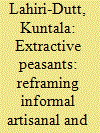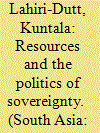| Srl | Item |
| 1 |
ID:
149920


|
|
|
|
|
| Summary/Abstract |
Coal dominates energy production of modern India, shaping the economic and political milieu of the country and dictating its energy future. But invisible to the state’s view of coal running the nation, are roles played by this commodity in the livelihoods of millions of poor who live on the coal tracts of the country. In this paper, I argue that there are four coal economies — with yet another one lurking within or following behind as a shadow — in India. Each of these economies has different meanings of coal to those who are involved in the economy, producing the'diverse worlds’ of coal. To substantiate my argument, I critically analyse official and field-based primary data within a'diverse economies framework’ to present the intricate interlinkages among these worlds. I show that the multiple coal worlds are neither tiered in a hierarchical manner, nor'parallel’ in the sense of dualism implied in a simplified formal-informal dichotomy. Rather, these worlds of coal have different actors, and their domains are ruled by different norms and values about the qualities of coal as a material commodity; yet they overlap and intersect with each other through their complex labour regimes.
|
|
|
|
|
|
|
|
|
|
|
|
|
|
|
|
| 2 |
ID:
163056


|
|
|
|
|
| Summary/Abstract |
This paper explores the ongoing reconfiguration of peasant labour processes from agriculture to informal mineral extraction, outlining the motivations of the rural poor in adopting mining and quarrying, and discusses how social sciences can best account for this significant shift towards extractive livelihoods. It argues that the ‘extractive peasants’ best explain the contemporary changes in rural, mineral-rich tracts throughout the Global South, and peasant mining practices are part of the informal economies. The extractive peasants return intellectual attention to practices that disrupt contemporary global mineral production and place the politics of the poor within broader debates on resource politics.
|
|
|
|
|
|
|
|
|
|
|
|
|
|
|
|
| 3 |
ID:
130578


|
|
|
|
|
| Publication |
2014.
|
| Summary/Abstract |
In the context of mineral extraction in South East Asia, the rural poor are generally portrayed as victims of large, invading corporatized mining enterprises. However, this paper argues that local villagers have also shown considerable agency in taking advantage of the mineral resource boom by diversifying their livelihoods to include informal mining. In South East Asia, the growth of informal mining has occurred within the overall process of agrarian transition. This paper focuses on a mineral-rich valley in southern Laos to highlight the location-specific nature of such transitions. The valley's environmental transformation has both caused and accompanied a modification in the peasant ways of life, and the recent entry of transnational mining companies and the growing market price of tin have fundamentally altered the relationships of the peasants with place, while at the same time encouraging them to claim mineral resource rights in ways that are not accommodated in conventional mining legislation. To conclude, the paper notes the multiple interpretations and contradictions of the increasing mineral dependence among Lao peasants in a rapidly changing world.
|
|
|
|
|
|
|
|
|
|
|
|
|
|
|
|
| 4 |
ID:
185111


|
|
|
|
|
| Summary/Abstract |
The rapid expansion of urban development in Asia over the last 50 years has seen a rise in demand for building materials. From large construction companies to squatter settlers seeking to improve their housing, concrete is the building material of choice. In the Philippines there is plentiful supply of the limestone and aggregate (sand and gravel) required for concrete production. Alongside the large quarries owned by major corporations are small, often illegal quarries, supplying aggregate to the construction industry. In these shadow places informal miners scratch out a precarious livelihood. They are members of a vast artisanal and small-scale mining (ASM) workforce that is global in extent. This paper situates informal aggregate mining in the diverse economy of concrete in the Philippines and within the context of global ASM studies. With a detailed study of one quarry on the edges of Metro Manila, it reveals how mining contributes to the survival portfolio of poor households. Without romanticising the lives of quarry labourers, we identify a range of negotiations by which informal miners create a community of commoners in a contested quarry site. This research provides insight into the capacities that informal miners could bring to designing more sustainable development pathways within and beyond the extractive industry.
|
|
|
|
|
|
|
|
|
|
|
|
|
|
|
|
| 5 |
ID:
157090


|
|
|
|
|
| Summary/Abstract |
This paper analyses the socio-legal and political spaces within which coal is mined in India and asks if it is possible to raise the ‘moral question’ when the state attributes an iconic status to coal. The empirical evidence comes from two indigenous-dominated states that practise community coal mining. If the coal mining communities in Jharkhand exert a moral claim by mining illegally, those in Meghalaya exert a political claim by invoking the special status the state enjoys under the Indian Constitution. This paper examines this grey zone of non-legality in order to understand resource conflicts and dispossession beyond the straightforward distinctions between legal and illegal.
|
|
|
|
|
|
|
|
|
|
|
|
|
|
|
|